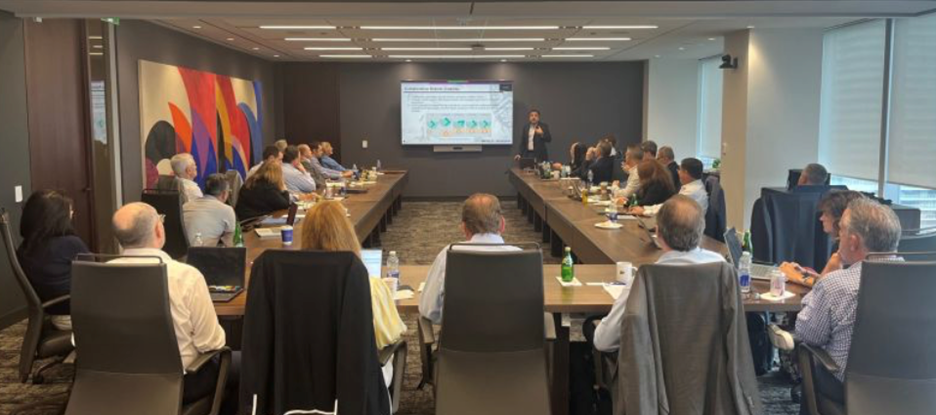The AI-Powered Industrial Revolution: Reshaping Manufacturing’s Future
- Gian Vergnetti

- Jul 24, 2025
- 4 min read
Updated: Sep 9, 2025

The term “Industrial revolution” may be overused, but it is certainly starting to feel like one. As the AI gold rush marches on, it’s hard to wrap one’s head around the magnitude of change, let alone the pace at which it’s occurring.
Advances in AI, compute, and a thriving ecosystem of innovators, developers, and supporting technologies are converting much of what visionaries of the digital age have preached for decades into reality before our eyes. Markets will ebb and flow as they always do (lots of flowing lately!), but regardless of precisely how much hype exists at this moment, the lasting impacts on the real economy are undeniable.
The prospect that we are in the early stages of this revolution can feel overwhelming - at EnerTech Capital we’re thrilled to be on the front lines of this transformation.

One area we’ve been spending more time on is digital manufacturing. These advances are driving a paradigm shift in efficiency gains and resilience amidst shifting labor dynamics, supply chain scrutiny, a rapidly evolving geopolitical landscape, and ever-present quality, cost and competitive pressures.
We are fortunate to collaborate with a diverse group of industry-leading manufacturers including Allison Transmission, Adient, American Axle & Manufacturing, Caterpillar, Cummins, Linamar, and Martinrea, as investors and partners; as well as visionary founders pushing the boundaries of what’s possible with innovation.
This intersection provides us with a unique perspective on the practical adoption of solutions in the near term as well as cutting edge innovation further out on the curve. Decades of progress in areas like data science and robotics, now supercharged by advances in AI, is igniting new capabilities in everything from automating repetitive tasks to building intelligent, adaptive systems addressing more complex, unstructured or dynamic workflows.

At our recent EnerTech Strategic Advisory Board meeting, held in Toronto (thanks to Canaccord Genuity for hosting!), we dove into some of the opportunities and challenges in digital manufacturing with experts like Matt Rendall, Founder of Clearpath Robotics (acquired by Rockwell Automation), William Melek, Director of the Laboratory of Computational Intelligence and Automation and the RoboHub at University of Waterloo, and George Gianarikas, Senior Equity Research Analyst at Canaccord Genuity. These discussions validated some of our perspectives while challenging others, sparking fresh insights.
Key Takeaways on Digital Manufacturing:
Specialized Solutions Win: Manufacturing often demands tailored, vertical solutions over one-size-fits-all approaches, sometimes better suited for consumer applications
Turn-Key is King: Enterprises want outcomes, not just tech. Comprehensive, ready-to-deploy solutions are critical for adoption
Services Matter: Technology is the foundation, but delivering robust, end-to-end solutions gives companies a competitive edge
Implementation Hurdles: Customization can slow deployment and inflate costs, making streamlined integration a priority
A Strong Digital Foundation: Fragmented data, poor connectivity, weak cybersecurity, or opaque systems can derail progress. Transparency and explainability are non-negotiable.
Accessibility is Key: No use having the best technology if people don’t understand how to use it – lower adoption barriers, make it accessible, and provide the skills required to use it productively; decision-makers need clear ROI, and workforces require the expertise and resources to deploy and scale effectively
Sustainable Funding is Critical: Ever-larger funding rounds and inflated valuations don’t guarantee success and may harm innovation in the medium term. When market rationalization occurs, overhyped investments can lead to capital flight, leaving promising technologies underfunded and stalling progress.
EnerTech Investment Strategy in Digital Manufacturing:
At EnerTech Capital, our Global Strategic Mobility Fund is constructed around 5 key investment themes, with digital manufacturing as a core focus area (see below). Our thesis in digital manufacturing centers on solutions that boost productivity, address labor dynamics, enhance supply chain resilience, and drive efficiency and cost savings across the enterprise. Some of the areas in which we are actively seeking investment opportunities include the following:
AI & Automation including Agentic and Physical AI enabled enterprise solutions improving processes and workflows, from basic, repetitive tasks to dynamic decisioning and execution across complex environments; workforce platforms that enable productivity, collaboration, upskilling
Digitalization & Data solutions including enterprise software and digital tools that support decision intelligence, quality control, advanced engineering/ design, business process management, supply chain optimization; cyber security and compliance automation as well as data security, and governance
Robotics & Industrial IoT offerings such as autonomous or collaborative robotic solutions addressing resource/labor-intensive applications; preference for minimized barrier integration and orchestration; diverse applications that range from sewing to welding to inspection to material handling and everything in between; sensor or connectivity enabled solutions to better manage systems, people, and processes
Additive Manufacturing & Advanced Materials that enabling accelerated development and production, new properties and form factors, flexible manufacturing

Digital manufacturing is a dynamic space in a transformative time, and we are excited by the possibilities.
So, what’s next? How will AI and robotics redefine manufacturing? What does this new era of productivity look like to you? Share your thoughts below—we’d love to hear your perspective!
- Gian Vergnetti

Comments